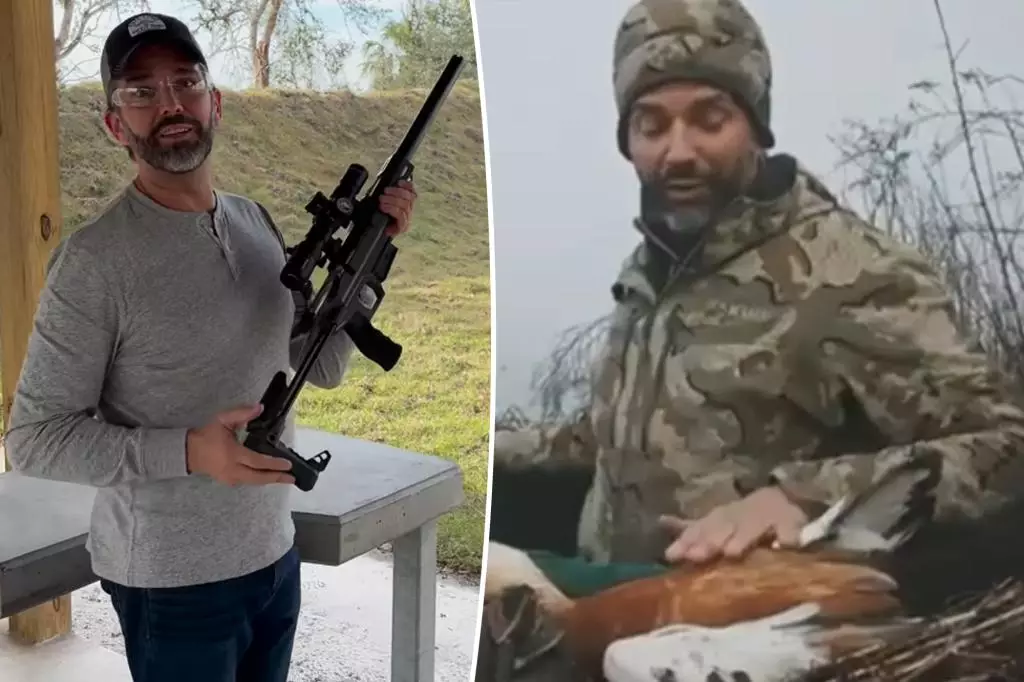Donald Trump Jr. has found himself in the midst of a contentious uproar sparked by his recent hunting excursion in Italy, a trip that has elicited sharp criticism from local animal rights activists and politicians alike. His jaunt to the picturesque shores near Venice has shifted from a leisurely getaway to a pressing matter of legal implications and ethical scrutiny, raising significant questions about hunting regulations and wildlife conservation in Europe.
The controversy ignited when a video surfaced featuring Trump Jr. participating in a duck hunting outing that involved the shooting of various birds, including one rare duck species suspected to be a Ruddy Shelduck. This particular incident has raised alarm among environmental advocates who argue that hunting such a rare bird contravenes the ideals of conservation. Local activists have been vocal in their condemnation, likening the situation to a disregard for ecological responsibilities.
Activists have expressed outrage, questioning the legality of Trump Jr.’s actions in Italy, where specific regulations govern who can hunt and under what circumstances. Reports indicate that, legally, only residents of certain Italian regions can acquire the necessary licenses to hunt. This detail has intensified calls for an official inquiry into Trump Jr.’s actions, with some officials suggesting he may have breached local laws designed to protect vulnerable species.
In response to the backlash, Trump Jr.’s spokesperson, Andy Surabian, has firmly defended the former president’s son, asserting that all necessary permits were in place and that the hunting group was operating within a legally sanctioned area. Surabian noted that there remains uncertainty regarding the unfortunate shooting of the rare bird, claiming that it is not clear if Trump Jr. himself was responsible for the incident.
Despite these assurances, the fallout has persisted. There are conflicting narratives about who might have shot the rare duck, with one anonymous participant suggesting there is insufficient evidence to pinpoint blame on Trump Jr. This lack of clarity only fuels the controversy, as the focus shifts to the broader implications of his actions and the responsibilities of hunters when engaging in wildlife activities.
Political Ramifications
The political ramifications of this incident are becoming increasingly significant, with multiple local politicians urging for a thorough investigation into the hunting trip. Andrea Zanoni, a Green Party politician, made headlines when he pointed out that foreign nationals—like Trump Jr.—are barred from hunting in Italy unless they are residents with proper documentation. Zanoni’s calls for accountability highlight the delicate balance between tourism, recreation, and conservation—a challenging dynamic, especially in regions striving to protect their natural ecosystems.
Moreover, Luana Zanella, an Italian MP, has urged the Minister of the Environment to address the situation, emphasizing the importance of holding individuals, regardless of their status, to account for alleged violations of hunting laws. Other politicians have echoed these sentiments, indicating that Trump Jr.’s celebrity status should not shield him from the legal ramifications that would apply to any ordinary citizen.
The Bigger Picture
This incident sparks a broader discussion on the ethics of hunting and the responsibilities of those privileged enough to partake in such activities. Are hunting expeditions, like that of Trump Jr.’s, merely recreational outings, or do they carry implications that resonate with issues of wildlife conservation and legal accountability? These are questions that resonate deeply within the realm of outdoor recreation and environmental stewardship.
Moreover, Trump’s previous controversies surrounding rare animal hunts—such as his highly criticized hunting trip in Mongolia—illustrate a pattern that raises concern among conservationists and advocates for animal rights. The presence of high-profile figures in the hunting arena often invites scrutiny that can challenge established norms and laws, as well as the ethical dimensions surrounding such activities.
As the dust settles on this latest chapter of controversy surrounding Donald Trump Jr., the broader implications for hunting regulations and wildlife conservation practices in Italy and beyond emerge as crucial points for discussion. Whether or not Trump Jr. faces tangible legal consequences remains to be seen, but one fact becomes increasingly clear: the actions of influential individuals carry weighty ramifications not just for themselves, but for the communities and ecosystems that surround them.
The incident underscores the ongoing need for accountability within the world of hunting, especially as it relates to the protection of vulnerable species. As discussions unfold, one can only hope that this serves as a catalyst for stricter enforcement of hunting laws and a renewed focus on conservation efforts on a global scale.

